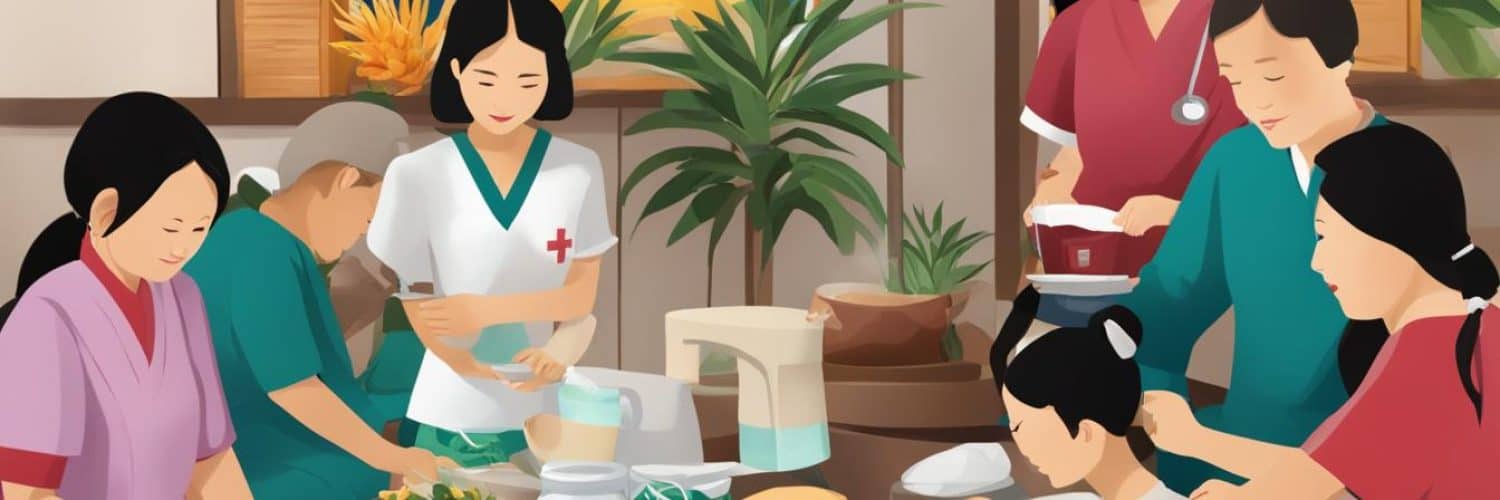The Philippines is rapidly emerging as a leading destination for medical tourism, attracting an increasing number of international patients every year. This growth can be attributed to the country’s exceptional healthcare professionals, state-of-the-art facilities, and affordable medical services. With its strong foundation in Western medicine and a commitment to personalized patient care, the Philippines has established itself as a reliable choice for individuals seeking high-quality medical treatments.
Key Takeaways:
- The Philippines offers a combination of highly skilled medical professionals, advanced facilities, and affordable healthcare services.
- The country has a strong historical tie with the United States, resulting in the incorporation of Western medicine into its healthcare system.
- Filipino medical institutions have gained international recognition and accreditation for their quality healthcare services.
- The Philippines places a strong emphasis on providing an exceptional patient experience, offering tailor-made packages and vacation-style recovery options.
- Popular medical procedures in the Philippines include cosmetic surgery, dental procedures, ophthalmology, cardiology, and orthopedics.
Historical and Cultural Significance in Medicine
The healthcare system in the Philippines is the product of a unique blend of historical, cultural, and international influences. With its historical ties to the United States and a rich heritage of Filipino healing practices, the country offers a healthcare experience that marries the best of both worlds.
The Philippines has a long-standing historical connection with the United States, which directly influenced the incorporation of Western medicine into the country’s healthcare system. This integration has paved the way for the adoption of advanced medical practices, technologies, and standards.
“The Philippines’ historical ties with the United States have played a significant role in shaping its healthcare landscape. The American influence has brought about modern medical practices and facilities, ensuring that patients receive quality care that meets international standards.”
However, the healthcare system in the Philippines goes beyond Western medicine. It proudly preserves and integrates traditional Filipino healing practices, recognizing their cultural significance and value. Traditional Filipino medicine focuses on a holistic approach to healthcare, addressing not only physical ailments but also the spiritual and emotional well-being of individuals.
This unique combination of modern Western medicine and traditional healing practices sets the Philippines apart as a distinct and culturally significant destination for healthcare.
The Cultural Significance of Filipino Healing Practices
Filipino healing practices have been passed down through generations, with indigenous knowledge and healing rituals forming an integral part of Filipino culture. These practices reflect the deep connection between the Filipino people and their natural environment.
Traditional Filipino healing practices include:
- Hilot – An ancient Filipino healing technique that utilizes touch and massage to promote physical and spiritual balance.
- Herbal Medicine – The use of indigenous plants and herbs to treat various ailments and promote overall well-being.
- Traditional Birth Attendants – Skilled community members who assist in childbirth, incorporating traditional practices to ensure safe deliveries.
This cultural significance in medicine enhances the patient experience by providing a holistic approach to healing that considers not only the physical symptoms but also the emotional and spiritual well-being of individuals.
The integration of Western medicine and traditional Filipino healing practices reflects the country’s commitment to providing healthcare that respects and values its cultural roots, making the Philippines a unique and culturally enriching destination for medical tourism.
Reputation for Quality
The Philippines is gaining a reputation for its exceptional medical expertise and commitment to quality healthcare services. Medical institutions in the country have been recognized and accredited internationally, solidifying its position as a reliable destination for medical tourism.
One of the key factors contributing to the Philippines’ reputation is the training received by Filipino doctors and nurses in the United States and other developed countries. This exposure to advanced medical practices and cutting-edge technologies ensures that these medical professionals possess the necessary skills and expertise to deliver world-class healthcare services.
“The Philippines’ medical institutions have gone above and beyond in maintaining the highest standards of patient care and medical excellence. We continuously invest in our medical workforce, ensuring that they have the necessary skills and knowledge to provide top-notch healthcare services,” states Dr. Maria Santos, a renowned medical expert in the Philippines.
The commitment to quality is further reinforced by the international accreditations obtained by many hospitals and clinics in the Philippines. These accreditations serve as a testament to the adherence to strict standards of medical practice, patient safety protocols, and the overall quality of healthcare services provided.
Patients seeking medical treatment in the Philippines can have peace of mind knowing that they will receive top-quality care in a reliable and trustworthy environment. The combination of medical expertise, international accreditations, and a commitment to excellence makes the Philippines a preferred destination for medical tourism.
In the next section, we will explore the exceptional patient experience offered by medical institutions in the Philippines and the tailor-made packages available for medical tourists.
Focus on the Medical Tourist
In the pursuit of providing an exceptional patient experience, medical institutions in the Philippines go above and beyond to cater to the needs and preferences of medical tourists. Tailor-made packages are offered to ensure a seamless and personalized journey, from the moment they arrive in the country to their recovery period.
These packages often include:
- Airport pick-up: Medical tourists are greeted by the warm hospitality of the Philippines upon arrival, with transportation services arranged to take them directly to their chosen medical institution.
- In-hospital translators: To overcome language barriers and ensure effective communication, medical institutions provide professional translators who can assist patients during consultations, procedures, and post-operative care.
- Vacation-style recovery: Recognizing that recovery is not solely about medical treatment, but also the overall well-being of the patient, medical institutions in the Philippines offer vacation-style recovery options. This allows patients to relax and rejuvenate while enjoying the beauty and hospitality of the country.
By focusing on personalized care, attention to detail, and enhanced patient experience, the Philippines sets itself apart as an attractive destination for medical tourists seeking tailor-made packages that address their unique needs and desires.
“The seamless and personalized patient experience offered by medical institutions in the Philippines is truly commendable. From airport pick-up to in-hospital translators and vacation-style recovery options, every aspect is thoughtfully designed to ensure the highest level of comfort and satisfaction.” – Dr. Maria Santos, Medical Tourism Expert
| Benefit | Description |
|---|---|
| Enhanced Comfort | Medical tourists can expect a comfortable and stress-free experience with personalized services and amenities. |
| Seamless Care | From arrival to recovery, every aspect of a medical tourist’s journey is carefully coordinated to ensure a smooth and efficient process. |
| Holistic Well-being | Vacation-style recovery options allow patients to indulge in relaxation and enjoyment while focusing on their physical and emotional healing. |
Popular Medical Procedures
The Philippines is renowned for its expertise in a wide range of medical procedures, making it a popular destination for medical tourism. The country offers exceptional quality and affordable options for cosmetic surgery, dental procedures, ophthalmology, cardiology, and orthopedics. Patients from around the world come to the Philippines to undergo various treatments and benefit from the advanced medical facilities and skilled healthcare professionals.
Some of the most sought-after procedures in the Philippines include:
- Rhinoplasty: Known for its precision and natural-looking results, rhinoplasty is a common cosmetic procedure in the Philippines. Patients can achieve the desired shape and size of their nose, enhancing their facial features.
- Breast Augmentation: The Philippines is renowned for its expertise in breast augmentation, offering patients a range of options for enhancing their breast size and shape. With advanced techniques and high-quality implants, patients can achieve their desired results.
- Dental Implants: The Philippines is home to experienced dentists who provide top-notch dental procedures, including dental implants. Patients can restore their smile and improve oral health with the help of advanced dental technology.
- Lasik Eye Surgery: The Philippines is at the forefront of ophthalmology, offering state-of-the-art Lasik eye surgery. Patients can correct their vision and reduce or eliminate the need for glasses or contact lenses.
These are just a few examples of the popular medical procedures available in the Philippines. Whether it’s enhancing appearance or improving overall health, patients can find exceptional medical expertise and facilities in the country.
The image above depicts a patient undergoing a cosmetic surgery procedure, highlighting the attention to detail and precision that is offered in the field of cosmetic surgery in the Philippines.
Specializations and Pioneering Treatments
The Philippines is at the forefront of medical advancements, specializing in innovative treatments such as stem cell therapy and robotic surgery. By investing in cutting-edge technology and building expertise in these areas, the country is emerging as a leader in providing state-of-the-art medical solutions.
Stem cell therapy has gained significant attention in the medical field for its potential in treating a range of conditions. The Philippines offers advanced stem cell treatments that harness the regenerative properties of stem cells to promote healing and enhance the body’s natural recovery process.
Another significant advancement is robotic surgery, which combines the precision of robotic technology with the expertise of skilled surgeons. This minimally invasive approach results in faster recovery times, reduced pain, and improved surgical outcomes.
“The integration of stem cell therapy and robotic surgery into the medical landscape has opened up new possibilities for patients seeking personalized and advanced treatment options.” – Dr. Maria Santos, Chief Surgeon at Manila Medical Center.
These specialized treatments are reshaping the healthcare landscape in the Philippines. Patients from around the world are increasingly attracted to the country’s expertise and exceptional medical services, making it a sought-after destination for those seeking pioneering medical treatments.
Top Hospitals & Clinics
When it comes to medical tourism in the Philippines, several hospitals and clinics stand out for their exceptional healthcare services and patient care. These renowned institutions have earned international recognition and accreditation, making them sought-after destinations for medical tourists.
St. Luke’s Medical Center
Located in Metro Manila, St. Luke’s Medical Center is a world-class healthcare facility. With state-of-the-art equipment and a highly skilled medical staff, St. Luke’s offers a wide range of medical services, including specialized treatments and surgeries. Patients can expect exceptional care and a comfortable environment during their stay.
Makati Medical Center
Situated in the heart of Makati City, Makati Medical Center is known for its cutting-edge medical technology and expertise. The hospital provides comprehensive healthcare services across various specialties, ensuring that patients receive the highest standard of care. Makati Medical Center’s commitment to innovation and patient satisfaction sets it apart as a top choice for medical tourists.
Cebu Doctors’ University Hospital
In the vibrant city of Cebu, Cebu Doctors’ University Hospital is a leading healthcare institution offering a wide range of medical disciplines. The hospital boasts modern facilities, advanced medical equipment, and highly trained medical professionals dedicated to providing personalized care. Patients can expect excellent medical services in a compassionate and patient-centered environment.
“These top hospitals and clinics in the Philippines have gained international recognition for their commitment to delivering high-quality healthcare services and exceptional patient care.” – Medical Tourism Magazine
For medical tourists seeking world-class healthcare, St. Luke’s Medical Center, Makati Medical Center, and Cebu Doctors’ University Hospital are top choices. By combining state-of-the-art facilities, skilled medical professionals, and a patient-centered approach, these institutions ensure a positive medical tourism experience for patients from around the world.
Cost Comparison
When it comes to medical procedures, cost is often a significant factor for patients. Fortunately, medical tourism in the Philippines offers a compelling solution with its cost-effective healthcare services. Patients can expect to save between 40-80% on medical procedures compared to Western countries.
Imagine being able to undergo heart bypass surgery at a fraction of the cost while receiving the same level of quality care. These savings make the Philippines a popular choice for medical tourists seeking affordable yet reliable medical procedures.
Quality & Safety
The healthcare system in the Philippines prioritizes international standards of medical practice and places a strong emphasis on patient safety. To ensure the highest level of quality and safety, hospitals and clinics in the country undergo stringent accreditation processes.
“Our commitment to providing exceptional healthcare is reflected in our adherence to international standards. We continuously strive to meet and exceed the expectations of our patients, implementing the best practices and protocols in patient care and safety.” – Dr. Maria Santos, Chief of Quality Assurance at St. Luke’s Medical Center.
Accreditation systems play a vital role in upholding the quality and safety of healthcare facilities in the Philippines. These systems evaluate medical institutions based on various parameters, including the qualifications of medical professionals, adherence to best practices, and the availability of advanced medical equipment and facilities.
In addition to accreditation, strict patient safety protocols are followed to ensure a safe healthcare environment. These protocols encompass measures such as infection control, medication safety, and patient identification procedures. By strictly adhering to these protocols, medical institutions in the Philippines prioritize patient well-being and minimize the risk of adverse events.
Patient rights are highly respected in the Philippines’ healthcare system. Patients have the right to informed consent, allowing them to make decisions about their treatment after being provided with all relevant information. Furthermore, patient confidentiality is strictly maintained, safeguarding their personal and medical information.
International Collaborations for Patient Safety
The Philippines is committed to continuously improving patient safety by collaborating with international organizations and institutions. These collaborations aim to exchange knowledge, best practices, and experiences to enhance patient care and promote a culture of safety in the healthcare industry.
One notable collaboration is the partnership between the Philippines and the World Health Organization (WHO). Through this collaboration, the country receives technical assistance and guidance in implementing patient safety initiatives and improving healthcare quality.
| Hospital | Accreditation |
|---|---|
| St. Luke’s Medical Center | Joint Commission International (JCI) |
| Makati Medical Center | Philippine Accreditation System for Hospitals and Health Care Providers (PASHCAP) |
| Cebu Doctors’ University Hospital | Philippine Society for Quality in Healthcare (PSQua) |
Medical Visa Information
Foreign patients seeking long-term medical treatment in the Philippines are required to obtain a medical visa. To apply for a medical visa, you will need to provide the following:
- A valid passport
- Financial proof to demonstrate your ability to cover medical expenses
- Medical documents substantiating the need for treatment
The application process will require you to submit these documents to the Philippine embassy or consulate in your home country. It is important to note that the specific requirements may vary, so it is recommended to contact the embassy or consulate directly for the most up-to-date information.
Once your medical visa is approved, it will allow you an initial stay of up to two months, which can be extended as needed for the duration of your medical treatment. It is advisable to consult with your healthcare provider and the appropriate authorities to ensure compliance with the visa regulations and requirements.
Cultural Considerations
When seeking medical treatment in the Philippines, it’s important for foreign patients to be aware of and respectful towards the local customs and etiquette. The Filipino people are known for their warmth and hospitality, creating a welcoming environment for medical tourists.
Language and Communication: English is widely spoken in medical institutions throughout the country. This makes it easier for international patients to communicate with healthcare professionals and understand their medical treatment and instructions.
Dietary Considerations: Hospitals in the Philippines cater to international dietary requirements, ensuring that patients have access to food options that align with their cultural and personal preferences. Whether you have specific dietary restrictions or preferences, rest assured that the medical facilities in the Philippines will accommodate your needs.
“The Filipino people are renowned for their warm hospitality and personalized care, which extends to the medical tourism sector. Patients can expect a culturally sensitive environment that caters to their language, communication, and dietary needs.” – Dr. Maria Santos, Medical Director at Makati Medical Center
Conclusion
The growth of medical tourism in the Philippines has brought about numerous benefits for patients seeking quality healthcare services. The country’s healthcare system has evolved to provide cost-effective medical procedures while maintaining high standards of care. With a strong reputation in the global healthcare industry, the Philippines continues to attract a growing number of medical tourists.
One of the key advantages of medical tourism in the Philippines is the affordability of medical procedures compared to Western countries. Patients can save a significant amount of money, ranging from 40-80% on procedures such as heart bypass surgery. This cost-effectiveness makes the Philippines an attractive destination for those seeking high-quality medical treatments without the financial burden.
In addition to its cost advantages, the healthcare system in the Philippines emphasizes the patient experience. Medical tourists can expect to receive personalized care and attention, with tailor-made packages that include services like airport pick-up and in-hospital translators. The focus on providing a positive patient experience contributes to the overall growth of medical tourism in the Philippines.
As the reputation of the Philippines as a reliable healthcare destination continues to grow, so does the number of medical tourists seeking its services. With highly skilled medical professionals, state-of-the-art facilities, and a combination of Western and traditional healing practices, the Philippines offers a comprehensive and holistic approach to healthcare. Medical tourism has become an integral part of the country’s healthcare industry, boosting its economy and reinforcing its position as a trusted global healthcare provider.
FAQ
What is the significance of medical tourism in the Philippines?
Medical tourism in the Philippines has evolved due to its highly skilled medical professionals, state-of-the-art facilities, and affordable healthcare services.
How does the historical and cultural background of the Philippines impact its healthcare system?
The Philippines has a historical tie with the United States, leading to the incorporation of Western medicine in its healthcare system. The country combines modern medical practices with traditional Filipino healing practices, creating a unique and holistic approach to healthcare.
What contributes to the reputation of the Philippines as a reliable destination for medical tourism?
The Philippines has gained international recognition and accreditations for its quality healthcare services. Many Filipino doctors and nurses have received training in developed countries, contributing to the country’s reputation as a reliable medical tourism destination.
How does the Philippines focus on the medical tourist experience?
Medical institutions in the Philippines offer tailor-made packages for medical tourists, including services like airport pick-up, in-hospital translators, and vacation-style recovery options. The emphasis on personalized care and attention to detail makes the Philippines an attractive destination for medical tourists.
What are some popular medical procedures in the Philippines?
The Philippines is well-regarded for a range of medical procedures, including cosmetic surgery, dental procedures, ophthalmology, cardiology, and orthopedics. Popular procedures include rhinoplasty, breast augmentation, dental implants, and Lasik eye surgery.
Is the Philippines specializing in any particular treatments?
The Philippines is starting to specialize in certain treatments, such as stem cell therapy and robotic surgery. The country is investing in technology and expertise in these areas, positioning itself as a leader in these innovative medical treatments.
Which hospitals are recognized as the top medical institutions in the Philippines?
The top hospitals in the Philippines include St. Luke’s Medical Center, Makati Medical Center, and Cebu Doctors’ University Hospital. These institutions have received international recognition and accreditation for their high-quality healthcare services and patient care.
Are medical procedures in the Philippines more affordable compared to Western countries?
Yes, medical procedures in the Philippines are significantly more affordable compared to Western countries. Patients can expect to save between 40-80% on procedures like heart bypass surgery, making the Philippines a cost-effective choice for medical tourists.
What are the standards and safety protocols in the healthcare system of the Philippines?
The healthcare system in the Philippines adheres to international standards of medical practice. Hospitals and clinics undergo stringent accreditation processes, and patient safety protocols are strictly followed. Patients have the right to informed consent, and patient confidentiality is upheld.
What are the requirements for obtaining a medical visa in the Philippines?
Foreign patients seeking long-term medical treatment in the Philippines are required to obtain a medical visa. The application process typically involves providing a valid passport, financial proof, and medical documents substantiating the need for treatment. The medical visa allows for an initial stay of up to two months, extendable as needed.
How should patients consider the cultural aspects when seeking medical treatment in the Philippines?
Patients should be respectful of local customs and etiquette when seeking treatment in the Philippines. The Filipino people are generally warm and accommodating towards foreign patients. English is widely spoken in medical institutions, and hospitals offer food options that cater to international dietary requirements.
What are the benefits of medical tourism in the Philippines?
The evolution of medical tourism in the Philippines has led to numerous benefits, including cost-effectiveness, high standards of healthcare, and a focus on the patient experience. The reputation of the Philippines as a reliable healthcare destination continues to grow, attracting more medical tourists to avail of its quality medical procedures and services.
Source Links
- https://www.medicaltourism.com/destinations/philippines
- https://www.isc.hbs.edu/Documents/resources/courses/moc-course-at-harvard/pdf/student-projects/Philippine_Medical_Tourism_2008.pdf
- https://www.studocu.com/ph/document/icct-colleges-foundation/bs-in-tourism-management/olthc-001-activity-9-chapter-9/32060517







Add comment